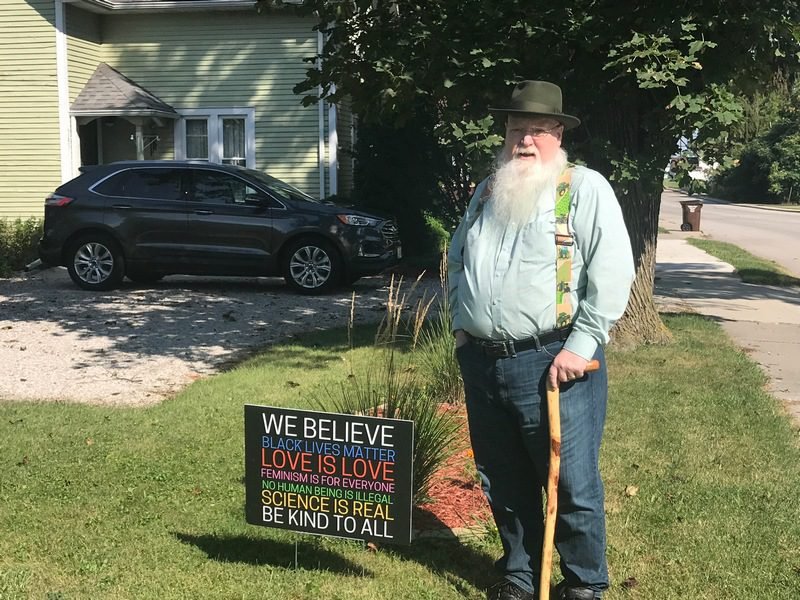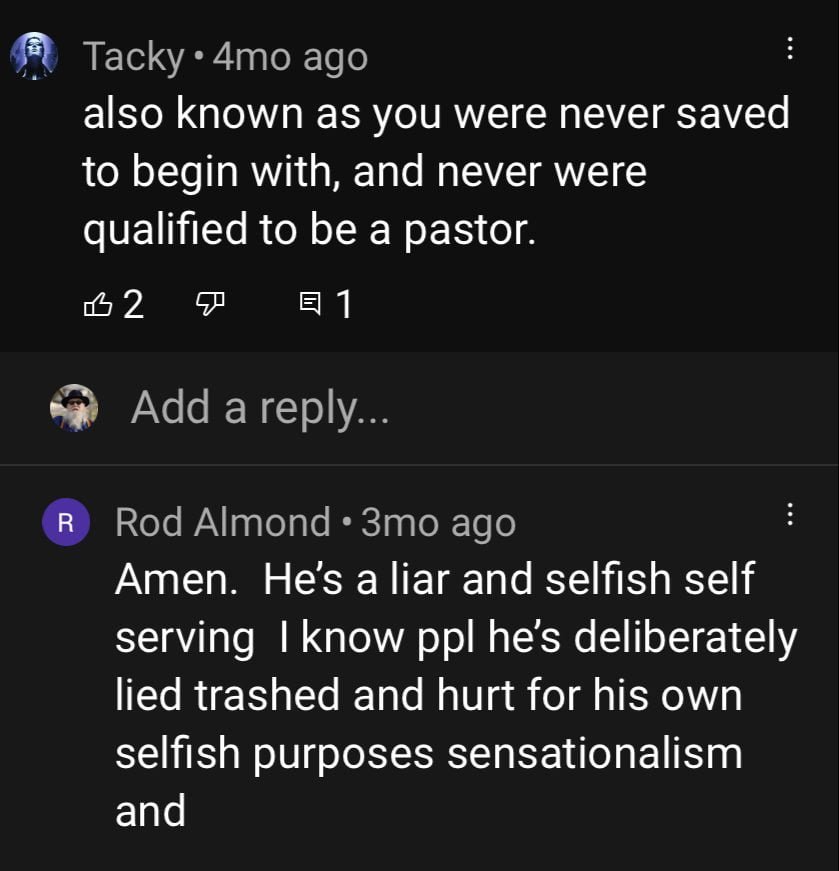Insanity: doing the same thing over and over again and expecting different results.
— Unknown
As an outspoken atheist and writer, I frequently come in contact with Evangelical Christians who think they have a duty to express their opinions about my past and present life and what awaits me after I die. Couched in Bible verses and regurgitated religious verbiage, their pronouncements are little more gnats flying around my head on a warm summer day. Irritating, to be sure, but nothing that can’t be dispatched with a quick swat of snark or reason. On days that I am in too much pain to snarkily respond, I allow Christian drones to aimlessly buzz around my head, knowing that if I ignore them, they will soon move on, or one of my regular readers will turn them into a splat. On rare occasions, I unsheathe my sword and spend time cutting to shreds Evangelical presuppositions, proof-texting, and sermonizing. What remain the same, regardless of the level of my response, are the repetitive arguments and statements used by Evangelicals to express their dislike/hatred of something I have written or said.
Come November, it will be fourteen years since I darkened the doors of a church; thirteen years since I wrote the infamous letter, Dear Family, Friends, and Former Parishioners, and let everyone know that I no longer considered myself a Christian; thirteen years of being inundated with emails, blog comments, and social media comments from Evangelicals determined to show me the error of my ways. It’s been years now since a Christian has said something related to my deconversion or past life that I have not heard countless times before. After several thousand or more God wants me to tell you __________ emails and comments, I now just shake my head or laugh when I receive such things.
Occasionally, when I need a bit of humorous levity, I will respond, knowing that most Evangelicals interlocutors aren’t really interested in what I have to say. I have long since concluded that many zealots love to hear themselves talk. Such people aren’t really interested in my spiritual state as much as they are reinforcing their own beliefs. My story — fifty years in the Christian church, twenty-five years as a pastor, and now an atheist — is disconcerting and troubling for many people. If someone such as myself can fall away, then so can they. So, when reading my story, they attack me personally instead of wrestling with their own fears, doubts, and cognitive dissonance. This is why several former parishioners have told me that they can no longer talk to me. These people, who once called me pastor, preacher, and friend, find my current godless state so troubling that it causes them psychological pain. Instead of investigating their pain or examining their own beliefs, these former parishioners or friends choose to end our relationship (and I am fine with that).
Several years ago, a woman who was a teenager in one of the churches I pastored in the 1980s messaged me, thanking me for sending her a link to some old pictures I had posted a year ago on Facebook. (Her father is the focus of the post Dear Friend.) Evidently, my message ended up in her spam folder and she did not find it until this week. This woman, now in her forties, made no attempt to talk to me about family or any of the other commonalities we humans share. Instead, she said, WHAT HAPPENED TO YOU? Immediately, my mind went back to the days when this woman was a rebellious, haughty, mouthy teenager — a constant pain in her parents’ asses. I envisioned her with her head thrown back, curling her face into a snarl, saying, WHAT HAPPENED TO YOU? I did not respond to her, choosing not to waste time responding to someone who really isn’t interested in what I have to say. (Years later, we reconnected on Facebook.)
in 2015, my two (now one since one of them died of COVID-19 last year) remaining Christian friends ran into a man I have known since the early 1970s. (I believe he is ten or so years younger than I am. I was mainly friends with his oldest brother and parents.) After trading pleasantries with my friends, this man said, CAN YOU BELIEVE WHAT HAPPENED TO BRUCE? I am sure he heard about my deconversion from his parents. After receiving news of me leaving Christianity, his mother had sent me a blistering letter that suggested in no uncertain terms that I was under the control of Satan. A year or so later, I received an apology from her (a rare occurrence). While she could not comprehend how I could ever walk/run away from Jesus, she did accept the fact that nothing she could say would likely change my mind. People who know me well know that I am a man of deep convictions and intellectual acumen. They also know that I am rarely swayed by circumstance or emotion. When confronted with the possibility that I could be wrong, I tend to study the heaven out of the issue. I want to KNOW, so blissful ignorance or “faithing it” is not an option for me.
Several years ago, my doctor told me that my heart is skipping every fourth beat and that I might have an “atrial whisper.” He ordered an EKG and told me to me wait as he consulted with a cardiologist. He smiled and asked me if I had something to read. I laughed, and pointed to my iPhone. Having been my doctor for twenty-five years, he knows that I tend to study the life out of things. By the time he had punched in the phone number of the cardiologist, I was on Web MD and Wikipedia looking up “atrial flutter” and other related heart/health issues. This illustrates perfectly how I tend to go after challenges to my beliefs or understanding. When I don’t “know” something, I make it my mission to increase my knowledge. Despite health problems that increasingly rob me of the physical and mental wherewithal to read, learn, and write, I am still driven to know more today than I did yesterday. This is why people who are close to me know that I rarely speak on a matter before knowing the facts. (I am not suggesting that I can’t be wrong or act irrationally. I can. Just ask Polly.) 🙂
An Evangelical woman (a friend of a friend) left the following Facebook comment for me:
I’m sorry that you have lost your contact with God. He’s still there, if you are interested. You may have stopped believing, but he hasn’t stopped existing or loving you. May God bless you. We have exchanged comments in the past and I don’t want to re-open that debate. This post just struck me as being very sad and empty, so I wanted to give a bit of encouragement. That’s all.
Here’s a woman who is incapable of understanding any other way of life or system of belief but her own. For her, Jesus is the be-all and the end-all, the reason for getting up in the morning. As she looks at my life through her rose-colored Bible glasses, all she sees is sadness and emptiness. She cannot comprehend a good life, an honorable life, a blessed life, and a life of meaning and purpose without knowing her peculiar version of Jesus as Lord and Savior. For her, my life does not compute. If she really cared about me as a person, she would trawl the depths of my story, and having done so she would then know that telling me, “I’m sorry that you have lost your contact with God. He’s still there, if you are interested. You may have stopped believing, but he hasn’t stopped existing or loving you,” will not elicit the desired response, and will likely be viewed by me as the words of yet another tone-deaf Christian.
Evangelicals need to understand that I am immune to their words. I have reached a point in my life where I rarely respond to their comments, sermons, or attacks. I prefer to spend my time writing and hanging out with Polly. If I sense a Christian sincerely wants to “know” then I will send them a few links to blog posts that I think will answer their questions. Sadly, few of these people bother to read the suggested posts. No need, right? They know what they know, even if what they know is dead wrong.
A better use of time for Evangelical zealots would be to seek out those who have no understanding of Evangelical belief and practice. Ignorance is the fertile ground of Christian Fundamentalism. Why tell someone the gospel twice before everyone has heard the gospel once, right? Well, I have heard it and preached it thousands of times, and when Christians continue to spew the same intellectually vacuous arguments and attempt to emotionally manipulate me, I don’t hear a word they are saying. Their lips are moving, but I ain’t listening.
I know that nothing I have written here will ward off garlic-immune Evangelicals who believe they have a God-given duty to put in a good word for Jesus. Until such people can dare to fathom the possibility of being wrong, there is nothing I can say or do that will change their minds. Only unrequited doubt will put them on the path to intellectual freedom. As long as their minds are shackled to God, Jesus, and the Bible they will continue to view me as an enemy that must be vanquished. Little do they know that they are tilting at windmills.
Bruce Gerencser, 66, lives in rural Northwest Ohio with his wife of 45 years. He and his wife have six grown children and thirteen grandchildren. Bruce pastored Evangelical churches for twenty-five years in Ohio, Texas, and Michigan. Bruce left the ministry in 2005, and in 2008 he left Christianity. Bruce is now a humanist and an atheist.
Connect with me on social media:
Your comments are welcome and appreciated. All first-time comments are moderated. Please read the commenting rules before commenting.
You can email Bruce via the Contact Form.
Share This Post On Social Media:










